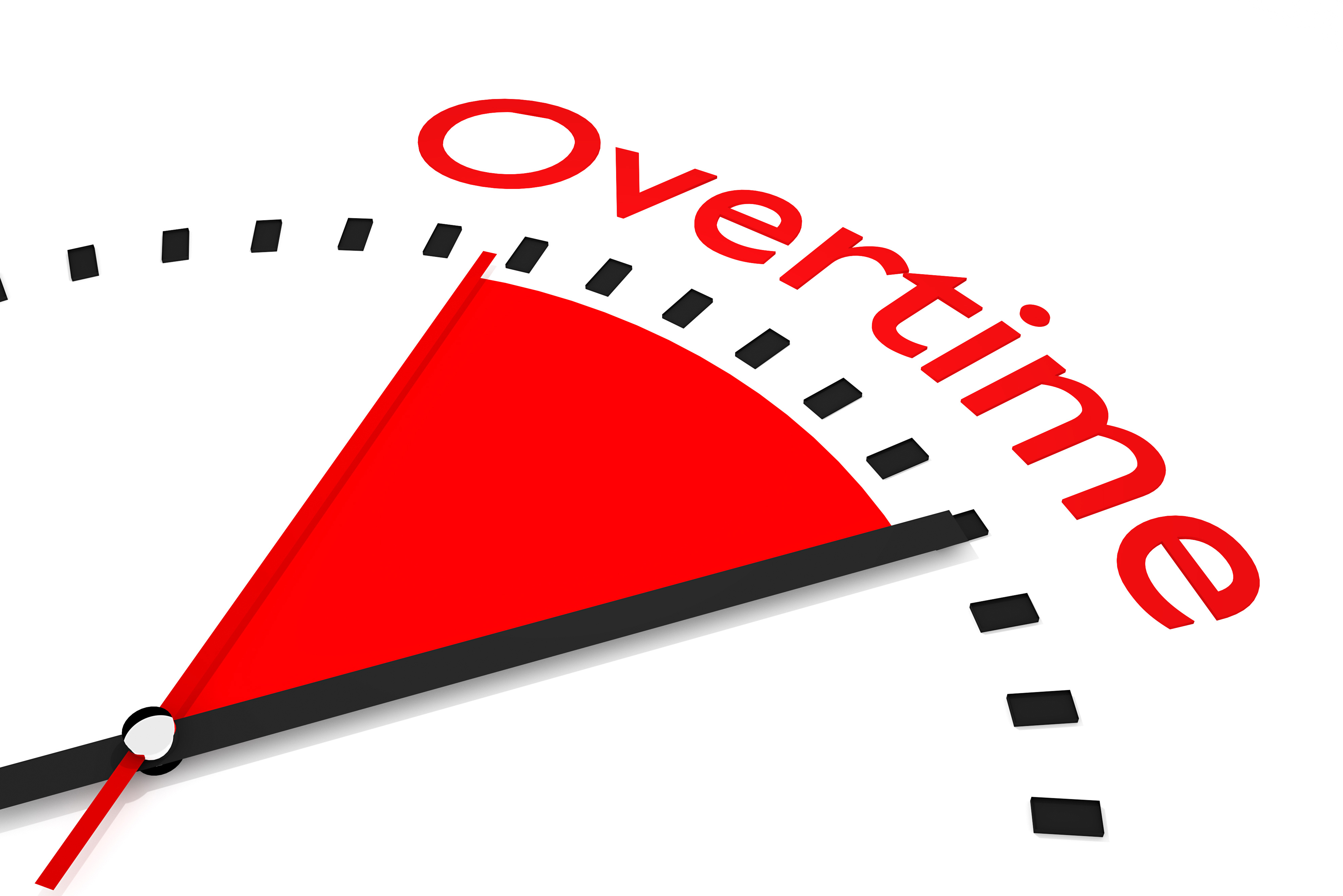Overtime Megan SEC - What You Should Know
Figuring out how pay works, especially when it comes to extra hours, can feel a bit like trying to solve a puzzle. It’s a topic that touches just about everyone who works for a living, and it often brings up questions about what kind of work qualifies for extra pay and what doesn’t. We're talking about those times when someone puts in more hours than the regular workday, and whether those extra moments on the clock mean a bigger paycheck.
This whole area of how people get paid for their time, particularly beyond the usual schedule, is really about making sure everyone gets what they're due. It’s not just about the hours themselves, but also the kind of tasks someone does during those hours. For instance, you know, sometimes a job title might sound like it’s one thing, but what a person actually spends their day doing is something quite different, and that makes all the difference for pay.
So, when we talk about someone like Megan, perhaps working at a place like the SEC, the details of her daily activities are actually quite important. It’s not just about punching a clock; it’s about understanding the specific types of work she performs and how those tasks fit into the bigger picture of wage laws. This really helps to clear up any confusion about whether her extra time should be paid at a higher rate.
- Enchanting Only Fans
- Rebecca Grant Twerking
- Bryan Garris Height
- Brittany Venti Ass
- Lilmermaidxx Nude Pics
Table of Contents
- Who is Megan and What's Her Deal with Overtime?
- What Does "Non-Exempt" Mean for Overtime Megan SEC?
- Why Do Actual Job Duties Matter So Much?
- How Do Employers Decide on Overtime Megan SEC Status?
- What Happens When Job Roles Shift?
- Are There Common Misunderstandings About Overtime Megan SEC Rules?
- Protecting Your Paycheck
- Getting Help with Overtime Megan SEC Questions
Who is Megan and What's Her Deal with Overtime?
Let's imagine Megan. She works at a well-known organization, perhaps something like the SEC, and her job involves a lot of varied tasks. She might have a job title that sounds pretty important, something that suggests she's in a position where she wouldn't get extra pay for working long hours. However, when you look at what Megan actually spends her time doing, it's a bit more complicated than just a fancy title. She might be spending a good chunk of her day, or even most of it, doing tasks that are usually done by people who do get paid extra for their time over 40 hours a week. This, you know, is where the whole "overtime Megan SEC" discussion really begins to matter for her.
This situation, where the actual work someone performs doesn't quite match up with what their job title implies, is a common source of confusion for many people. It’s not just about what a company calls your role; it’s about the nitty-gritty of your daily responsibilities. For Megan, if she's consistently doing work that typically qualifies for hourly pay, even if her job sounds like it should be salaried, there's a real question about whether she's being paid correctly for her extra efforts. It's almost, you know, like a secret that needs to come out.
Understanding Megan's specific situation means looking closely at her day-to-day. Is she managing big projects, or is she mostly handling routine paperwork? Is she making important decisions, or is she following set procedures? These are the kinds of questions that really help figure out if someone should be getting that extra pay for their time. It's pretty much, you know, the heart of the matter for her "overtime Megan SEC" situation.
- Distorted Fish Trope
- Moisturized Unbothered Meme
- Vanessa Morgan And Nathan Mackinnon
- Lavaxgrll Leaked Sex Tape
- Tgirl Mommy Gisele
What Does "Non-Exempt" Mean for Overtime Megan SEC?
When we talk about someone being "non-exempt," it simply means they are eligible for overtime pay. This is a pretty big deal because it means that if they work more than 40 hours in a workweek, their employer generally has to pay them at least one and a half times their regular hourly rate for those extra hours. It's a way of protecting people who work long hours, ensuring they get fair compensation for their added effort. For someone like Megan, whose daily tasks might lean towards non-exempt work, this distinction is actually quite important for her paycheck and her overall financial well-being. It's, you know, about getting what you deserve.
The opposite of "non-exempt" is "exempt," which means someone is not eligible for overtime pay. These roles typically involve higher levels of responsibility, specialized knowledge, or management duties. People in exempt positions usually receive a set salary, regardless of the hours they work. The challenge, and where Megan's situation comes into play, is when a job is labeled as exempt, but the actual work performed by the individual, perhaps at the SEC, looks a lot like non-exempt work. This is where the lines can get a little blurry, and it leads to questions about fair pay for "overtime Megan SEC."
So, the core of the issue for Megan and others like her is about how their actual daily work aligns with these definitions. If someone is spending most of their time on duties that are usually associated with hourly, non-exempt work, then there's a strong argument that they should be getting paid for their extra hours. It's a question of substance over title, really. This means looking beyond the job description and focusing on what someone truly does hour by hour, which is often a key part of figuring out "overtime Megan SEC" matters.
Why Do Actual Job Duties Matter So Much?
The reason why what someone actually does on the job is so important, more so than what their job title says, comes down to the fundamental rules about how people get paid. These rules are put in place to make sure that employers pay fairly for all the hours someone puts in, especially those extra ones. A job title, you know, can be pretty broad or even a bit misleading sometimes. It might sound impressive, but it doesn't always tell the full story of someone's day-to-day work. For someone like Megan, whose situation might involve the SEC, her specific tasks are the real indicators of her pay eligibility.
Think about it this way: someone could be called a "Senior Administrator," which sounds like an exempt role. But if that person spends 80% of their time answering phones, filing documents, and entering data, those are typically tasks that qualify for hourly pay. The law looks at the primary duties, meaning what someone spends the majority of their working hours doing. If those primary duties are mostly "non-exempt level," then the person should probably be classified as non-exempt, regardless of their title. This is, you know, a pretty big point for "overtime Megan SEC" discussions.
This focus on actual duties helps prevent companies from simply giving someone a fancy title to avoid paying overtime. It puts the emphasis on the real work being done, which is a much fairer way to determine someone's pay status. It’s about ensuring that the spirit of the law is upheld, not just the letter of a job description. So, when we look at Megan's work, especially if she's at the SEC, it's her daily activities that truly count in determining if she should get extra pay for her time. It's actually, you know, a protection for workers.
How Do Employers Decide on Overtime Megan SEC Status?
Employers have to follow specific guidelines when deciding whether a job is exempt or non-exempt. These guidelines usually involve a few key tests. First, there's a salary level test: generally, an employee must be paid a certain minimum salary amount each week to be considered exempt. If they don't meet that salary threshold, they are automatically non-exempt and eligible for overtime. This is, you know, a pretty straightforward part of the rules.
Beyond the salary, there are also "duties tests." These look at the actual responsibilities and tasks of the job. There are different categories for exemptions, like executive, administrative, professional, outside sales, and computer employees. Each category has its own specific set of duties that must be met for the exemption to apply. For example, an administrative exemption usually requires that the employee's primary duty involves office or non-manual work directly related to the management or general business operations of the employer or the employer's customers, and that it includes the exercise of discretion and independent judgment with respect to matters of significance. So, for someone like Megan, perhaps at the SEC, her daily work would be measured against these very specific criteria when considering "overtime Megan SEC."
The challenge for employers, and why misclassification can happen, is accurately assessing these duties. It's not always a simple yes or no answer. Sometimes, a job might have a mix of exempt and non-exempt tasks. The key is determining what the "primary duty" is, which means the principal, main, or most important duty that the employee performs. If an employee spends most of their time on non-exempt tasks, even if they occasionally perform exempt ones, they should likely be classified as non-exempt. This is, you know, a really important point for businesses to get right.
What Happens When Job Roles Shift?
Job roles aren't always static; they can change over time. Someone might start in a position with a certain set of responsibilities, and then, perhaps gradually, their daily tasks evolve. This can happen for many reasons: a new project comes up, team needs shift, or the business itself changes direction. When these shifts happen, it's really important for both the employee and the employer to take another look at the job's classification, especially regarding overtime eligibility. It's not just a one-time decision; it's something that might need revisiting, you know, every so often.
For someone like Megan, if her role at the SEC has changed, perhaps adding more routine tasks or fewer decision-making responsibilities, her overtime status might need to be re-evaluated. What might have been an exempt role initially could, over time, become one where the majority of her work is actually non-exempt. This is where the core idea comes in: "They need to be doing those duties most of the time with non-exempt level duties at a minimum." This phrase really captures the essence of the problem when job duties shift and are not reassessed. It's, you know, a pretty common issue.
Employers have a responsibility to keep up with these changes. If an employee's duties have fundamentally changed, their classification should change too, to ensure they are paid correctly. Ignoring these shifts can lead to problems, including unpaid overtime claims. For employees, being aware of their actual duties and how they align with overtime rules is a good idea. It helps them understand their rights and ensures they're getting paid fairly for their efforts, especially when it comes to "overtime Megan SEC" type situations. It's, you know, about staying current.
Are There Common Misunderstandings About Overtime Megan SEC Rules?
Yes, there are quite a few common misunderstandings when it comes to overtime rules. One of the biggest is believing that simply paying someone a salary automatically makes them exempt from overtime. That's actually not true at all. As we've discussed, salary is only one part of the equation; the actual duties performed are just as, if not more, important. Many people, and even some employers, get this wrong, thinking that if a paycheck comes in a fixed amount, no extra pay for extra hours is needed. This is, you know, a very widespread misconception.
Another misunderstanding is that if a job title sounds "professional" or "managerial," it must be exempt. Again, this isn't necessarily the case. A "manager" who spends most of their time doing the same tasks as the employees they supervise, rather than actually managing, might still be non-exempt. The law looks beyond the label to the substance of the work. This is particularly relevant for situations like "overtime Megan SEC," where a job title might seem important, but the daily reality is different. It's, you know, a tricky area for some.
There's also the idea that if an employee "agrees" to be salaried, they give up their right to overtime. This is another common mistake. Overtime eligibility is determined by law, not by agreement between an employer and employee. You can't sign away your right to overtime if your job duties legally qualify you for it. These misunderstandings can lead to significant issues for both employees who are missing out on pay and employers who might face legal challenges. It's really, you know, something that needs clarity.
Protecting Your Paycheck
For employees, knowing your rights about overtime is a powerful thing. If you suspect you're not being paid correctly for your extra hours, the first step is to really look at what you do every day. Keep a simple record of your tasks and the hours you spend on them. This doesn't have to be anything fancy, just a basic log that helps you remember what your typical day looks like. This record can be very helpful if you need to discuss your concerns with your employer or seek further advice. It's, you know, about being prepared.
If you believe your job should be non-exempt, but you're not getting overtime, consider having a calm, open conversation with your employer or your human resources department. Present your understanding of your duties and how they might align with non-exempt criteria. Sometimes, these are genuine mistakes that can be fixed. It's always a good idea to approach these conversations in a respectful way, aiming for a solution rather than an argument. This is, you know, a good first step.
Remember, the law is generally on the side of employees when it comes to proper classification and fair pay for hours worked. If you're consistently doing work that typically gets hourly pay, even if your job title or salary suggests otherwise, you might be owed overtime. Understanding the nuances of "overtime Megan SEC" situations can help you advocate for yourself and ensure you're getting paid fairly for all your efforts. It's, you know, about standing up for what's right.
Getting Help with Overtime Megan SEC Questions
If you've tried talking to your employer and still feel that your overtime situation isn't right, or if you just need more clarity, there are resources available. Government labor departments, both at the federal and state levels, provide information and assistance regarding wage and hour laws. They often have websites with detailed explanations of exemption rules and ways to file a complaint if you believe you've been misclassified or underpaid. These resources are there to help people understand their rights and get the pay they're due. It's, you know, a helpful place to start.
Another option is to speak with an employment lawyer. They specialize in these kinds of issues and can give you specific advice based on your unique situation. They can help you understand whether you have a strong case for unpaid overtime and guide you through the process of pursuing it, if necessary. Sometimes, just getting a professional opinion can really clear things up and help you decide on the best course of action. This is, you know, for when things get a bit more serious.
The bottom line is that no one should work extra hours without proper compensation if they are legally entitled to it. The rules are there to protect workers, and understanding them is the first step towards ensuring fair treatment. Whether you're a "Megan" at the SEC or someone working in a different field, knowing the difference between exempt and non-exempt duties is key to protecting your paycheck and making sure your hard work is valued appropriately. It's, you know, about empowering yourself.
This article has explored the complexities surrounding overtime pay, particularly focusing on how actual job duties determine eligibility rather than just job titles. We looked at how situations like "overtime Megan SEC" arise when an employee's primary responsibilities lean towards non-exempt tasks, even if their role might appear salaried. The discussion covered the meaning of "non-exempt" status, the critical importance of daily tasks over titles, and the methods employers use to classify roles. We also touched upon what happens when job duties change and addressed common misunderstandings about overtime rules. Finally, the article provided suggestions for employees to protect their paychecks and where to seek assistance for questions about overtime.



Detail Author:
- Name : Mike McGlynn
- Username : tia.koepp
- Email : austin45@gmail.com
- Birthdate : 2001-09-19
- Address : 39749 Alisha Pine Apt. 394 North Jacky, CA 85292
- Phone : (551) 742-8164
- Company : Thompson, Muller and Ullrich
- Job : Metal-Refining Furnace Operator
- Bio : Labore maiores et porro laudantium id. Ex enim dolore magnam optio sit. Commodi aut beatae commodi totam sint ut assumenda nihil.
Socials
instagram:
- url : https://instagram.com/mrowe
- username : mrowe
- bio : Sit maiores est accusantium. Rerum voluptatem dignissimos unde.
- followers : 2796
- following : 2579
twitter:
- url : https://twitter.com/malika_rowe
- username : malika_rowe
- bio : Officia sint beatae quis ut quo est quis. Sunt quam corporis totam dolorem fuga illum. Voluptatibus nesciunt molestiae illum vel eum quam molestias.
- followers : 6347
- following : 2828